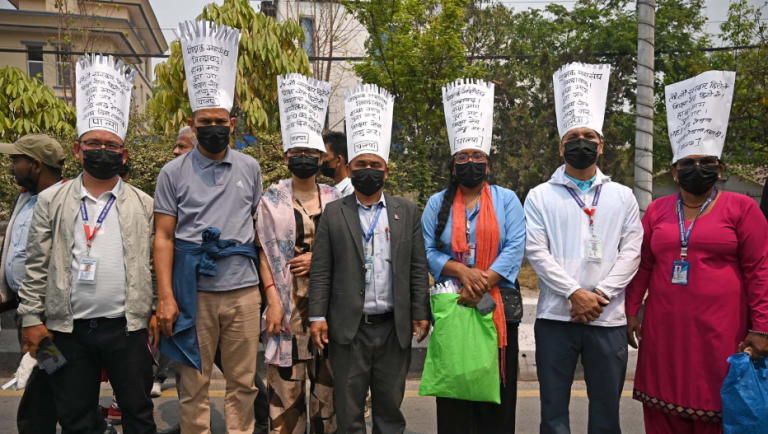Thousands of school teachers from all over Nepal protested in Kathmandu on Monday. They are asking the government to pass the long-awaited School Education Act without delay. The protest was led by the Nepal Teachers’ Federation, the national group that represents teachers. Wearing black masks, the teachers marched through the city streets in a peaceful and symbolic protest. They also declared a nationwide education strike starting April 7.
Teachers March for Education Reform
On Monday morning, teachers gathered in large numbers from Babarmahal to New Baneshwar, close to the Parliament building. They held signs, waved banners, and chanted slogans demanding the School Education Act.
The teachers said the government has failed to act on its promises. “We want clear laws to protect our rights and improve education,” said one protester. “Without action, students and teachers both suffer.”
Schools Close Nationwide as Strike Begins
The Nepal Teachers’ Federation has announced a complete educational strike. All teachers across the country were told to stop teaching, preparing exam results, and handling school work starting April 7.
A senior member of the Federation said, “We’ve waited for years. Now we are forced to take this step. This is not just about teachers. It’s about the future of students.”
This strike affects thousands of public schools and millions of students in Nepal.
Whistle Rally and Sit-ins Before the March
The protest on Monday was not the first step. On Sunday, the teachers organized a whistle rally in Kathmandu. They walked through the city blowing whistles to raise awareness.
Last week, the Federation held sit-ins outside the offices of major political parties. These peaceful protests were aimed at pushing leaders to take action on the School Education Act.
Why the School Education Act Is Important
The School Education Act is meant to fix many problems in the education system. It will give teachers job security, improve school management, and help provide better learning for students.
Right now, teachers say there is no clear law. This leads to problems in hiring, salaries, and promotions.
Education expert Dr. Kamal Adhikari said, “Nepal’s schools need a strong legal system. Without it, schools cannot improve, and teachers face unfair treatment.”
Government Has Yet to Respond
The government has not made any formal announcement about the Act. Officials have said that talks are in progress, but teachers say they have heard the same for too long.
A source at the Ministry of Education said, “We understand the protest. We are working on the bill, but it takes time.”
But the Federation says time is up. They want action now.
Parents and Students Worried About the Strike
Parents across Nepal are worried about the impact of the strike. Schools are shut, and exam results are delayed. This may hurt students’ academic progress.
One parent, Sushma Rai, said, “We support teachers, but we hope both sides talk and solve this soon. Our children need to study.”
Protests Will Continue Until Demands Are Met
The Nepal Teachers’ Federation has said that protests will continue until the School Education Act is passed. More rallies and strikes are planned in the days ahead.
They are also asking other education groups and civil society to support their cause.


